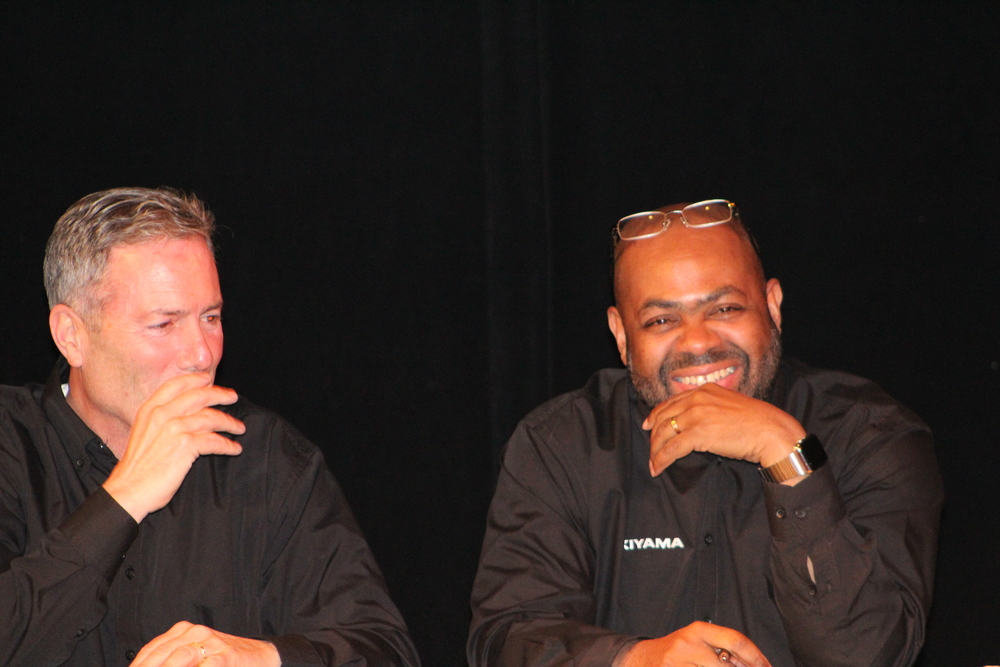So what exactly is "Rooting for Tarzan" and why does it matter?
Rooting for Tarzan is a no holds barred interactive lecture series designed to cut through the "static" that hinders our understanding of race in American society.
Watch the presenters speak here >
Robert Pellegrino, author of I See Color and Michael A. Jefferson, author of Deo Vindice: The Resurrection, have made it their mission to examine and challenge the racial socialization process of blacks and whites in American society. Both men, who have been friends for nearly 30 years take a no holds barred approach to tackling this issue. "We've been eager to have an honest, candid and thorough dialogue about race for years," Pellegrino says.
Relying on extensive knowledge obtained from reading scores of books, articles, essays, etc. and gaining additional understanding via personal and professional experiences, the two men unflinchingly delve into this highly controversial subject matter. With surgical precision they provide their audience with a thorough analysis of the problem and offer sound solutions for addressing what they call America's ancient sin.
[slide-left]So, why Tarzan?[/slide-left]
Bob and Mike attribute the title of their presentation - Rooting for Tarzan, to their experience as young children watching reruns of the classic film Tarzan the Ape Man.
In 1932 - Tarzan the Ape Man, starring Johnny Weissmuller - a white actor and Maureen O'Sullivan - a white actress, was released to moviegoers nationwide. It was the first of twelve movies starring Weissmuller as Tarzan -"king" of the jungle.
The plot involved a group from England on a safari somewhere in Africa searching for a mysterious elephant graveyard. The group is subsequently captured by a hostile native tribe of pygmies. Tarzan subsequently rescues the group.
The film made millions and Tarzan became a hero to millions of white and presumably black moviegoers. The idea of blacks rooting for Tarzan might seem strange to some, particularly since the movie depicts the African natives in such a humiliating light. However, not unlike today, most everyone cheers for the "hero" - even black moviegoers.
By today's standards such a movie would be deemed racist. But 80 years ago America was a different place, particularly as it pertained to race. Tarzan - the movie was in all likelihood viewed as an innocuous film that sought to appeal to white audiences. There is no evidence to suggest that the film was meant to serve as a propaganda piece for white supremacy - even though it did just that.
Tarzan and other movies of that era served as the foundation for the socialization of blacks and whites through the powerful medium of film. Casting whites as the bravest, smartest, prettiest, sexiest, strongest, etc., helped to perpetuate the false sense of superiority that has long enveloped the white psyche. Conversely, casting blacks as ignorant, lazy, unattractive, unintelligent, weak, buffoons, etc. served to perpetuate the false sense of inferiority that has long enveloped the black psyche.
Pellegrino and Jefferson believe Tarzan and other movies of that era served as the foundation for the socialization of blacks and whites through this medium.
“The presentation was phenomenal. I never heard the issue of race discussed in such a way. Every school system in America should find a way to put this presentation on their professional development agenda.”
[slide-right]Who is this talk for?[/slide-right]
Rooting for Tarzan is for any group seeking to have an open conversation regarding race relations in America, including:
- Colleges
- High Schools
- Community Groups
- Civil Servants (police, fire fighters, municipal workers, etc.)
- Professionals (educators, lawyers, doctors, journalists, etc.)
- Corporate Presentations
- Staff Workshops and Trainings
"We love speaking to college audiences because many in that crowd represent the future generation. Their minds are still open and they are willing to hear what we are attempting to convey," said Jefferson. "But we feel it's also imperative to have dialogue with teachers and other professionals who are seeking to gain a better understanding of the dynamics of race in American society."
The hope is to help professionals, particularly those who work in professions that impact individuals of color, improve the delivery of services in their own professional spheres by having honest and candid discussions from a black and white perspective. The authors believe their efforts can lead to a considerable improvement in race relations.
Interested in Hosting this conversation?





